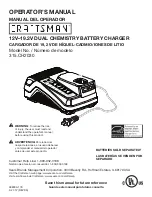
CHARGE RATE SELECTION
CHARGE RATE SELECTION
After the clamps are connected, plug in the charger to an AC outlet and the charger will show a
circulating pattern on the Digital Display. This pattern indicates power is a p plied. Press the ON/OFF
button to prepare the charger to change to an operating mode. Press the 2/10/20A button and the
charger will begin charging at 2 Amps. Pressing the 2/10/20A switch again will advance the charge
rate to iCA, then 20A. Pressing the switch again will turn OFF the charger output and the display will
show the circulating pattern.
Note that each time the charger rate is changed, the charger sounds a beep tone. The only time the
selected charge rate does not display at the full selected rate is when the battery is nearly full and
charging at either steps two or three. The display will be showing a slowing charge rate. To return to
2A, press the
2/10/20A
button. When the battery is fully charged, the charging Complete LED is lit
and “FUL” is displayed on the Digital Display.
CONNECTING IF BATTERY IS INSTALLED IN
CONNECTING IF BATTERY IS INSTALLED IN
A
VEHICLE
VEHICLE
a)
Check polarity of battery posts
-
For top-mounted battery connectors, the Positive post (marked P05,
P, +) usually has a larger diameter than the Negative battery post (marked NEG, N,
-).
-).
For side-
mounted battery connectors, the terminals are marked Positive -red and Negative -black.
b) Attach charger clamps to battery connections, as follows, ensuring a good connection (if there is a
mistake, the Reverse Polarity Indicator will light): NEGATIVE-GROUNDED VEHICLE: Connect the
POSITIVE (RED) charger clamp to the POSITIVE (P0S, P, +) ungrounded battery terminal. Then,
connect the NEGATIVE (BLACK) charger clamp to the vehicle chassis, or the engine block (away
from the battery). Do not connect the clamp to the carburetor, fuel lines, or sheet-metal body parts:
connect only to a heavy gauge metal p art of the frame or engine block. NOTE:
NOTE: NEGATIVE-
GROUNDED type systems are the most common in today
*
s vehicles.
c) Set charger
*
s charge rate to appropriate setting 2/10/20A according to battery size.
POSITIVE-GROUNDED
POSITIVE-GROUNDED VEHICLE:
VEHICLE: Connect the NEGATIVE (BLACK) charger clamp to the NEGATIVE
(NEG, N
N,
,
-)
-)
ungrounded battery post. Then, connect the POSITIVE (RED) kattery clamp to the vehicle
chassis or engine part (away from the battery). Do not connect the clamp to the carburetor, fuel lines,
or sheet-metal body parts:
connect only to a heavy gauge, stable metal part of the frame or engine block.
NOTE:
NOTE: If there is any problem connecting the charger clamps to the battery terminals, contact the
Vector Technical Support Department toll-free at (866) 584-5504 for assistance.
d) Plug battery charger power cord into grounded AC power outlet and refer to Appendix A at the end
of this document for approximate charging times.
e) When charging is completed, disconnect cables and clamps in reverse order from which they were
connected.
NOTE:
NOTE: Use of Extension Cords
If
it
is necessary to use an extension cord, as is often the case, observe the following important safety
information:
!
Before using any extension cord, ensure that the wire size is at least 12 AWG for up to 100 feet and
10 AWG for longer than 100 feet.
!
Use only a good quality, good condition, UL-listed extension cord, and ALWAYS connect charger to
the extension cord before plugging the extension cord into a 110/1 20 volt AC power outlet. The use
of a poor quality extension cord or one that is not in good repair could cause fire and/or electric
shock.
!
Use a three-wire extension cord with a 3-prong plug and 3-conductor socket.
VECO90
VECO90
7
Summary of Contents for VEC090
Page 1: ......
Page 5: ......
Page 6: ......
Page 13: ...VECO9O VECO9O 12 12 WARRANTY IS NON TRANSFERABLE AND NON REFUNDABLE ...































